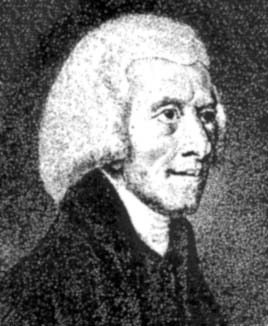


 تاريخ الرياضيات
تاريخ الرياضيات
 الرياضيات في الحضارات المختلفة
الرياضيات في الحضارات المختلفة 
 الرياضيات المتقطعة
الرياضيات المتقطعة
 الجبر
الجبر
 الهندسة
الهندسة 
 المعادلات التفاضلية و التكاملية
المعادلات التفاضلية و التكاملية 
 التحليل
التحليل
 علماء الرياضيات
علماء الرياضيات |
Read More
Date: 29-6-2016
Date: 27-3-2016
Date: 31-3-2016
|
Born: 15 December 1731 in London, England
Died: 19 May 1824 in Reigate, Surrey, England

Francis Maseres's parents were Magdalene du Pratt du Clareau and Peter Abraham Maseres. Originally of French origin, the family were protestants who were forced to leave France due to religious persecution after Louis XIV revoked the Edict of Nantes, which had guaranteed freedom of worship, in 1685. Peter Maseres was a doctor who first lived in Broad Street, Soho, London but then moved to Rathbourne Place. Francis had a brother Peter and they were brought up in a family that was well off.
Francis attended the Rev Richard Wooddeson's School in Kingston-upon-Thames before matriculating at Clare College, Cambridge, on 4 July 1748. Francis' brother Peter matriculated on the same day and both brothers graduated from Clare College Cambridge in 1752 with a degree in classics and mathematics. Francis was ranked as fourth wrangler meaning that he was fourth out of the students awarded a first class degree. Francis was awarded the first chancellor's classical medal which was presented to him by the Duke of Newcastle. He was awarded a Joseph Diggons scholarship in January 1752, awarded his MA in 1755, and elected to a fellowship on 24 September 1756 which he held until August 1759 when he resigned the fellowship when it still had a year to run.
In 1750 Maseres entered the Inner Temple meaning he was training to join the legal profession. He qualified in 1758 and practised law for a few years without too much success although his whole life was associated with The Temple which lies between Fleet Street and the Embankment in the City of London. He was described as walking round wearing:-
... the costume of the reign of George the Second ... [with] three-cornered hat, tie, wig, and ruffles.
He served as Attorney General for Quebec from 1766 until 1769 [3]:-
... with such zeal and dignity that on his return to England he was requested by the protestant settlers in that city to act as their agent.
After returning to England he was appointed Cursitor Baron of the Exchequer in August 1773 and held this office until his death at the age of 93. He was appointed deputy recorder of London on 16 February 1779 and he held the post until he resigned in 1783. He was elected senior judge in the Sheriff's Court of the city of London in 1780 and he held this position until 1822 when he was 91 years old. Courtney writes [3]:-
Maseres was a zealous protestant and Whig and a warm advocate for reforms in the church of England, but he was not in favour of a wide scheme of electoral reform.
Maseres wrote many mathematical works which show a complete lack of creative ability. He rejected negative numbers and that part of algebra which is not arithmetic, despite writing 150 years after Viète and Harriot. It is probable that Maseres rejected all mathematics which he could not understand. He wrote inDissertation on the use of the negative sign in algebra (1758):-
If any single quantity is marked either with the sign + or the sign - without affecting some other quantity, the mark will have no meaning or significance, thus if it be said that the square of -5, or the product of -5 into -5, is equal to +25, such an assertion must either signify no more than 5 times 5 is equal to 25 without any regard for the signs, or it must be mere nonsense or unintelligible jargon.
Maseres had an unfortunate influence on the teaching of algebra in Britain for several decades. An example of this is seen in the algebra text of Nicolas Vilant, Regius Professor at St Andrews from 1765 to 1807. Schaaf, writing in [1], gives a positive side to his mathematical contributions:-
Perhaps the many publication with which he strove to bring mathematics to a much wider public were the most notable aspect of Maseres' legacy. Some were original works; others were reprints of the works of distinguished mathematicians. ... Of the reprints that Maseres made at his own expense, the most significant is the "Scriptores logarithmici" (1791-1807), six volumes devoted to the subject of logarithms, including works of Kepler, Napier, Snell, and others, interspersed with original tracts on related subjects. Other republications include the following:
Presumably a number of authors were indebted to Maseres for financial assistance of this sort. there can be little doubt of his sincerity and generosity, even if somewhat misplaced.
Courtney gives more details of Maseres' personality in [3]:-
It was his delight to entertain his friends in his rooms in London or his country house at Reigate, and his conversation abounded in anecdote and information, particularly in the incidents of English history from 1640 to his own date. He kept up his taste for the classics. Homer he knew by heart, and Horace was at his fingers' ends. Lucan was his favourite next to Homer in ancient literature; among English writers he felt great admiration for Milton, and was thoroughly conversant with the works of Hobbes. He spoke French fluently ... and [he was] a good chess player ...
Articles:



|
|
|
|
تفوقت في الاختبار على الجميع.. فاكهة "خارقة" في عالم التغذية
|
|
|
|
|
|
|
أمين عام أوبك: النفط الخام والغاز الطبيعي "هبة من الله"
|
|
|
|
|
|
|
قسم شؤون المعارف ينظم دورة عن آليات عمل الفهارس الفنية للموسوعات والكتب لملاكاته
|
|
|